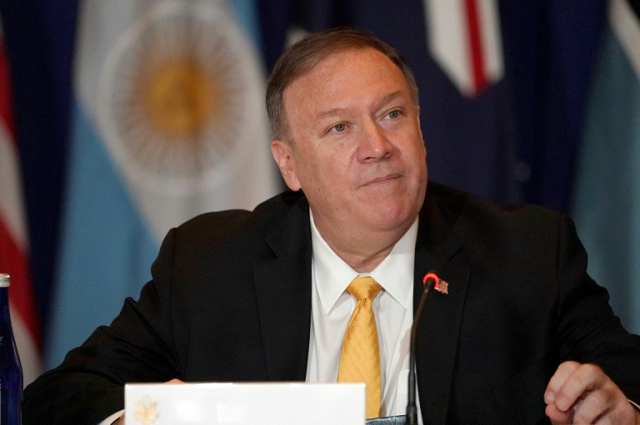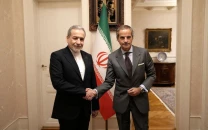US says Assad again used chemical weapons, vows action
As UN announces the formation of a committee to write a new Syrian constitution

US Secretary of State Mike Pompeo, seen here on September 26, said the Assad regime used chlorine in Latakia province. PHOTO: AFP
The Assad regime used chlorine on May 19 in Latakia province as part of its deadly offensive to take back the last major rebel stronghold in nearby Idlib, Secretary of State Mike Pompeo said.
"The United States will not allow these attacks to go unchallenged nor will we tolerate those who choose to conceal these atrocities," Pompeo told reporters in New York, where he was taking part in the UN General Assembly.
"The United States will continue to pressure the insidious Assad regime to end the violence directed at Syrian civilians and participate in the UN-led political process," he said.
No independent verification was available of the attack from war-ravaged northwestern Syria, where 400,000 people have been displaced since April alone from the government's bombardment.
The United States and France had both earlier aired suspicions of a chemical attack but had held off on making a formal determination, saying more research was needed.
International investigators say Assad has repeatedly used chemical weapons against civilian targets in his brutal quest to end the civil war, in which more than 370,000 people have died.
 Displaced Syrian children queue for their turn outside a bus converted into a classroom in Idlib in September 2019. PHOTO: AFP
Displaced Syrian children queue for their turn outside a bus converted into a classroom in Idlib in September 2019. PHOTO: AFPFormer president Barack Obama had called chemical weapons use a red line but ultimately declined military retaliation.
Drawing a contrast, President Donald Trump ordered strikes with 59 cruise missiles in response to a sarin gas attack in April 2017 in the militant-held Idlib town of Khan Sheikhun.
The reprisal evidently did not deter Assad, who enjoys strong support from Russia, which has deployed its air power and repeatedly vetoed efforts at the UN Security Council to punish the Syrian regime.
The United States announced one countermeasure on Thursday, slapping sanctions on a Russian network of three individuals and five vessels for supplying fuel to Russian forces in Syria.
Pompeo said that the United States was donating an additional $4.5 million to the Organisation for the Prohibition of Chemical Weapons, the Hague-based body that monitors the international treaty that bans such arms.
 The United States says that Syrian President Bashar al-Assad, seen here meeting church leaders in July 2019, has repeatedly used chemical weapons. PHOTO: AFP
The United States says that Syrian President Bashar al-Assad, seen here meeting church leaders in July 2019, has repeatedly used chemical weapons. PHOTO: AFPBut Pompeo appeared to downplay the prospect of military action, noting that the attack involved chlorine, which affects the respiratory system.
The Khan Sheikhun attacks, which the United Nations said killed 83 people, entailed sarin, an ultra-potent gas that devastates the nervous system.
"So it's a bit of a different situation," Pompeo said.
But he warned: "The Syrian regime should know and the world should appreciate the fact that we're going to do everything we can reasonably do to prevent this kind of thing from happening again."
The US finding on chemical weapons came in a week that offered one glimmer of hope, with the United Nations announcing the formation of a committee to write a new Syrian constitution.
The group will involve both the government and opposition, although there is no consensus on which direction they will take the constitution.
The Assad government, however, said it would not halt its military operations.
Syria is likely to be a major topic on Friday when Pompeo meets in New York with Russian Foreign Minister Sergei Lavrov.



















COMMENTS
Comments are moderated and generally will be posted if they are on-topic and not abusive.
For more information, please see our Comments FAQ